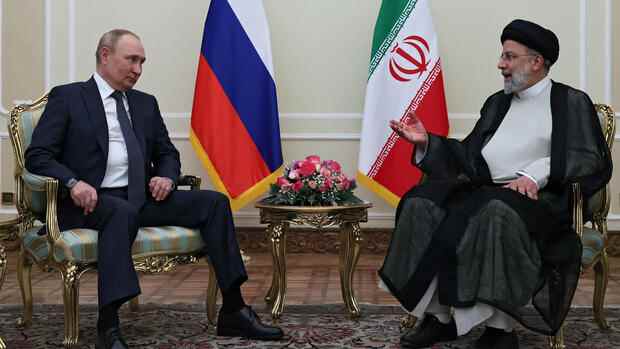Experts see a dichotomy in the Middle East.
(Photo: via REUTERS)
Tel Aviv Vladimir Putin’s trip is having a lasting effect: the Russian President met his colleagues from Iran and Turkey in Tehran on Tuesday evening – the summit in Israel is now being analyzed intensively. Russia’s demonstrative friendliness towards Iran was a warning to all US allies in the Middle East, everyone said.
This cements the division of the Middle East into two, argues Russian scientist Ksenia Svetlova, who teaches regional foreign policy at the Hebrew University of Jerusalem. There is now “a US-Israel-Saudi Arabia axis and a Russia-Iran-Belarus-North Korea axis”. She describes the latter as “the new axis of evil”. Svetlova fears that their future momentum will threaten Israel.
Svetlova also sees the three-way summit as a clear declaration of war on Joe Biden. From Jerusalem and Jeddah, the US President last week called on Israel and the Arab countries to resist increasing Russian, Chinese and Iranian influence.
Israel and the USA are primarily concerned with Iran’s threatened nuclear armament. Ultimately, the US would not shy away from using force to evade a nuclear threat from Iran, the US President said.
Top jobs of the day
Find the best jobs now and
be notified by email.
For action against Iran, the United States is counting on a united Middle East and closer cooperation between Israel and its Arab neighbors. Former rivals have established diplomatic and economic ties, Biden stressed – a reference to the rapprochement of several Arab states with Israel under the so-called Abraham Accords. Saudi Arabia still does not recognize Israel, but recently announced the opening of airspace for flights to and from Israel.
US diplomatic efforts in the Middle East are met with protests in Tehran.
(Photo: dpa)
A core theme of Biden’s presidency is the competition of systems, he is convinced that democracies are superior to authoritarian regimes. In Israel, Biden’s statement was particularly well received: “We will not leave a vacuum in the Middle East that Russia or China can fill.”
Political scientist Svetlova sees Putin’s trip to Tehran as a response to Biden’s new Middle East diplomacy. Putin wanted to show the US President that he was not isolated and was working on a power-political counterweight to this possible new alliance.
The nuclear power North Korea also recently reacted to the US’ increased diplomatic initiatives in the region. Pyongyang said it would increase its own military clout.
In Israel, however, the economic issues of the Tehran three-summit also aroused interest. Specifically: the billion-dollar gas deal between Russia and Iran, which had been announced before the summit began. The Iran expert Maciej Wojtal believes that this is intended to emphasize that Iranian-Russian cooperation in the energy sector works better than that between the Saudis and the USA.
Economically, Russia is too weak to stabilize Iran
However, the head of the investment company Amtelon Capital points out that this is merely a declaration of intent. Four years ago, Moscow announced that it would become intensively involved in the Iranian gas industry. “But nothing like that happened,” says Wojtal. Above all, Putin wants to announce that he is investing in Iran, while everyone else is holding back.
Wojtal therefore sees the announcement primarily as a “political statement”. In any case, Putin can hardly support Iran economically, since both countries produce similar products and are in fact competitors.
US President listens to Mohammed bin Salman during Gulf Cooperation Council. The Saudi prince joined via video.
(Photo: dpa)
Bilateral trade currently amounts to two billion dollars a year, two percent of Iran’s total foreign trade. In January, Iran’s President Raisi spoke of a fivefold increase. However, Iran could be useful for Russia as a hub for circumventing sanctions. “Russia uses the Iranian infrastructure to sell in countries like Pakistan or India,” says Wojtal.
The Israeli Middle East analyst Ehud Yaari says there are hardly any opportunities for military cooperation between Russia and Iran either. Putin wants to buy drones in Iran, and Tehran dreams of equipping its fighter jets and tanks with Russian technology. But that’s unrealistic, says Yaari.
Moscow needs its armaments industry for the war in Ukraine. And Tehran is unable to supply enough drones because the ayatollahs would have to invest in factories to do so. But above all: Iranian drones fly with engines from Europe that cannot be obtained due to the sanctions.
Israel is considered the world market leader for drone technology. Israel has been using drones to attack targets in the Gaza Strip for more than a decade.
More: Putin creates his own world order – and the West looks on helplessly
